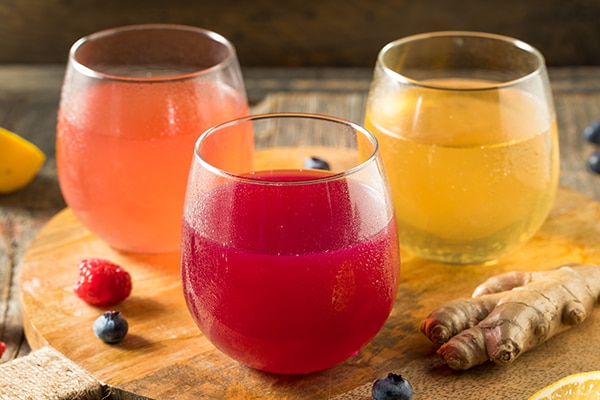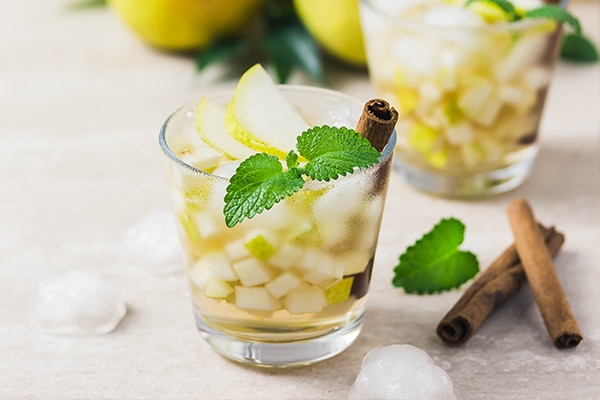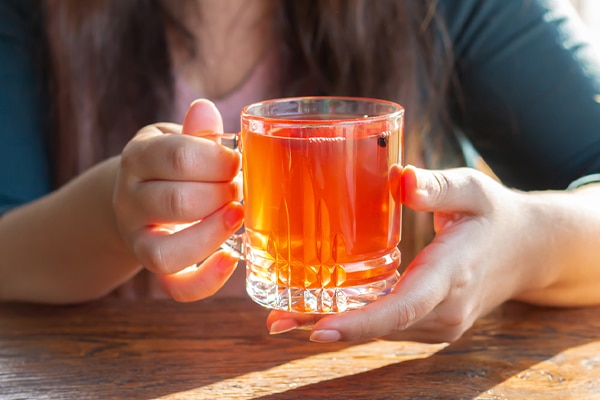Is hard kombucha good for you?
You might have already heard of kombucha, the popular, fizzy drink packed with bacteria and yeast, but what about hard or alcoholic kombucha?
Hard kombucha is the latest craze in fermented tea, with many people choosing it as a healthier alternative to beer and cider.
But what actually is hard kombucha, and does it have the same benefits as non-alcoholic kombucha?
We'll give you the low down on everything you need to know about this delicious alcoholic beverage, so keep reading to find out more.
What is hard kombucha?
Kombucha is a gently fizzy, slightly sour drink made from sweetened black or green tea and fermented using a SCOBY (symbiotic colony of bacteria and yeast).
The fermentation process creates a trace of alcohol, but the alcohol by volume usually reaches no more than 0.5%, so most kombucha drinks are labelled non-alcoholic.1
Hard kombucha, however, will have a much higher alcohol content than the traditional version of the fizzy, fermented cold tea drink. It is fermented repeatedly and for longer than regular kombucha to increase alcohol levels. Typically, the alcohol content of this boozy brew is around 4-7%.1
With various flavours and brands now on the market, hard kombucha is fast becoming more popular amongst the hip and health conscious.

How to make a boozy brew
Making high alcohol kombucha requires the same core ingredients as the regular version of the drink – water, tea, sugar, and a SCOBY.
So, what's the difference?
It's all down to the amount of added sugar, a different type of yeast, and the length of the fermentation process.
Non-alcoholic (or low alcohol) kombucha only needs one or two rounds of fermentation.
However, to increase the alcohol content, the process repeats several more times. Adding more sugar and another strain of yeast in the additional rounds, the alcohol content of the brew rises.
Kombucha cocktail ideas
Fancy mixing up a batch of mouth-watering cocktails for your next night out (or in)? Why not try adding in some kombucha?
Try using a non-alcoholic kombucha as a mixer in your favourite classic cocktail for a unique twist, or try hard kombucha as an alternative to your usual alcoholic drink.

The benefits of hard kombucha
The gut-friendly potential of the traditional version of the drink is widely reported.
Kombucha contains live cultures that can help to maintain a friendly population of bacteria in your gut. This may aid digestion and support your immune health (but there's limited research to support these claims).2
But what happens to the live microorganisms as the alcohol levels rise?
There are questions and various opinions about whether good bacteria can survive in a boozier environment. Unfortunately, there don't seem to be any consistent answers, leaving any suggested gut-friendly benefits of high alcohol kombucha very much up for debate.
In reality, any wellness boost offered by hard kombucha is likely to be pretty minimal. Still, it can offer some benefits over other alcoholic beverages.
The benefits of hard kombucha include things like:
- It contains antioxidants: the beneficial acids remain intact after fermentation, so alcoholic kombucha can retain some antioxidant capabilities.
- It's gluten-free: as a gluten-free drink, hard kombucha can be an alternative to beer, especially for those who can't consume wheat.
- It's lower in sugar and calories: kombucha generally has a lower sugar and calorie content than other alcoholic drinks. But all of this will vary depending on each drink's sugar and alcohol content.
Can kombucha help with hangovers?
When you drink alcohol, your body absorbs toxins that can make you feel - let's face it - not so great the following day. Finding the perfect hangover cure may seem daunting, but kombucha could be the way forward.
Kombucha is full of electrolytes, vitamins and minerals that are sometimes depleted after a night of drinking. Drinking some kombucha can help boost your electrolytes, B vitamins and C vitamins to stop you from feeling dehydrated and nauseous.3
Kombucha is also naturally packed with glucaric acid. Glucaric acid helps your liver to detoxify and get rid of toxins from your body. Drinking some kombucha can help speed up this process and remove the toxins quicker.3

Summary: What is the difference between kombucha and hard kombucha?
The main difference is that hard kombucha is intentionally fermented to have higher alcohol content. This means it's not suitable for children under 18, pregnant women, designated drivers, and anyone who avoids drinking alcohol.
Whilst many hard kombuchas only have a relatively low amount of alcohol by volume, some high alcohol versions can have around 7% ABV. As the alcohol content of pre-bottled varieties varies, it's wise to check the label before selecting your drink.
And finally, does hard kombucha get you drunk? The raised alcohol content could undoubtedly leave you feeling tipsy. And unfortunately, although hard kombucha may be gentler on your gut than some alcoholic drinks, it can still give you a hangover the morning after.